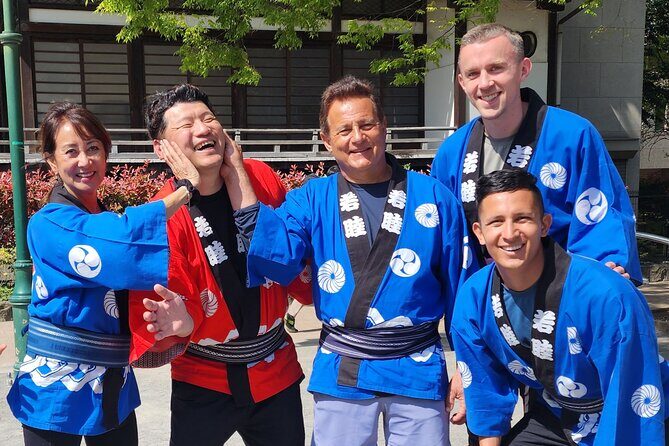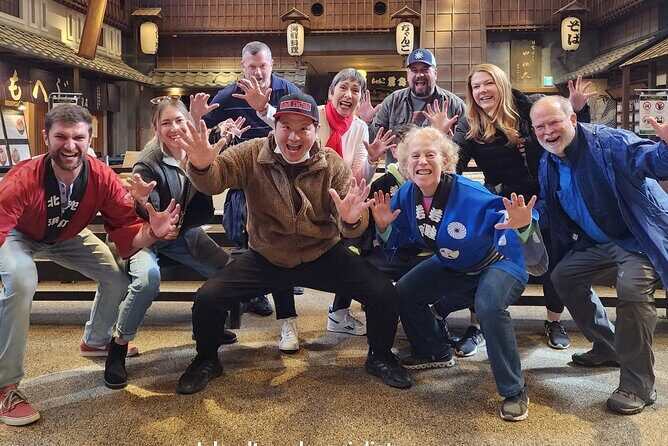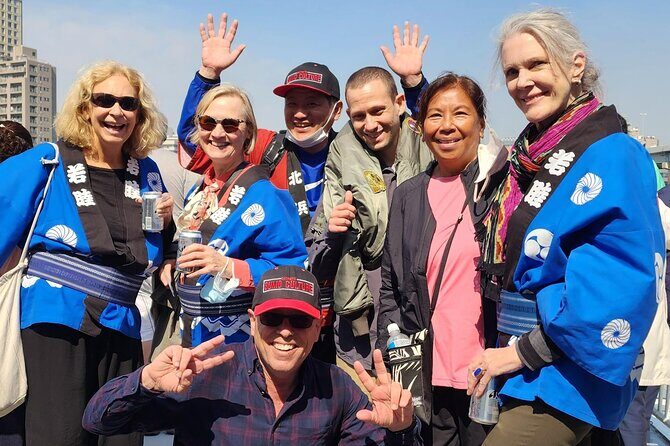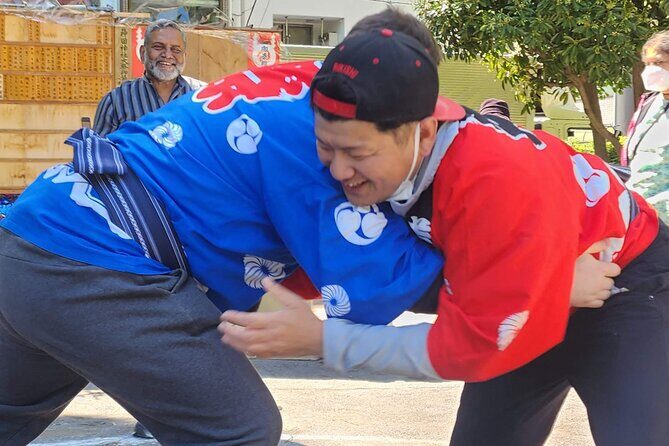If you’re heading to Tokyo and want to get a real taste of Japanese culture, a sumo tour like this offers a captivating glimpse into one of Japan’s most revered sports. Priced at $196 per person, this approximately four-hour experience takes you beyond the arena, blending history, tradition, and hands-on activities guided by knowledgeable locals like Ken and Shin. Expect to explore the Kokugikan stadium, visit a traditional Japanese garden, and learn about the rituals and spiritual significance behind sumo wrestling.
What we really love about this tour is how passionate guides make everything understandable and engaging—whether it’s explaining the elaborate rituals or demonstrating sumo moves. You’ll also appreciate the chance to ask questions directly and see real sumo wrestlers training if the schedule aligns. One potential consideration: the tour’s focus on cultural context may not satisfy those looking solely for a live sumo match or inside training stables, especially when schedules change unexpectedly.
This experience suits travelers eager to understand Japanese traditions, history buffs, or those simply curious about their national sport. If you enjoy interactive, educational tours with a personal touch, you’ll find this adventure rewarding.
Key Points

- Authentic insight into sumo’s cultural and spiritual importance in Japan
- Guides like Ken and Shin bring enthusiasm and knowledge that make the experience memorable
- Visit a traditional Japanese garden and other cultural sites in the Ryogoku district
- Opportunities for hands-on participation and asking questions throughout the tour
- Approximate four-hour duration offers a rundown without being overwhelming
- Affordable value considering the depth of cultural context and personal interaction
A Close Look at the Experience
Planning more time in Tokyo? We've covered other experiences worth considering.
What the Tour Covers and Why It Matters
This tour begins at the Ryogoku district, the heart of sumo in Tokyo. You’ll meet your guides at the Rygoku Edo NOREN, a location well connected by public transport, making it easy to find and convenient to access. From there, the journey takes about four hours, during which you’ll explore multiple facets of sumo culture—not just watching the sport but understanding its history, rituals, and spiritual roots.
The Sumo Arena and Cultural Context
The main highlight, of course, is the sumo tournament held at Kokugikan Stadium. Many reviews mention that you might be upgraded to see a full tournament, which is a rare and exciting opportunity. One traveler noted, “Ken was a great host and made sure we all enjoyed ourselves,” emphasizing the importance of a friendly, knowledgeable guide when navigating Japan’s complex rituals.
While some reviews express disappointment when training sessions are canceled or not accessible—a common occurrence due to athletes’ schedules—the guides do their best to fill the experience with cultural explanations and demonstrations. You’ll learn about the significance of rituals like salt-throwing, the attire, and the spiritual symbolism embedded in sumo training and matches, often described as religious rituals blending Buddhism and Shinto practices.
Visiting a Traditional Japanese Garden
Another favorite part of the tour is the visit to a traditional Japanese garden—a quiet, contemplative space that offers a peaceful contrast to the energetic sumo arena. Many reviewers appreciated this stop, noting it as “a beautiful slice of Japan’s natural beauty,” where they could take photos and reflect on the cultural harmony between nature and tradition.
Hands-On Activities and Guide Interaction
One of the standout features is the interactive nature of the tour. Guides like Ken and Shin are praised for their friendly demeanor and extensive knowledge, often sharing personal anecdotes that make the history come alive. Several reviewers mention learning basic sumo moves or even participating in simulated matches—a highlight for those wanting a more active experience.
- Düsseldorf: Manga, mochi & more Düsseldorf’s Little Tokyo
- From Tokyo: Mt. Fuji Spanish & English Tour
- Downtown Los Angeles : Historic district & Little Tokyo
- Outdoor Escape Room in LA – Little Tokyo
- LA Little Tokyo to Olvera St Smartphone (App/GPS) Walking Tour
- 1-Day Mt Fuji and Hakone Sightseeing trip from Tokyo
Meeting Actual Sumo Wrestlers
Depending on the schedule, you may get the chance to see professional wrestlers training or even observe them performing rituals up close. One reviewer stated, “Seeing live sumo wrestlers in front of your eyes was a breathtaking experience,” emphasizing how rare and memorable this can be. However, schedules are subject to change, and sometimes training sessions are not accessible, which some travelers found frustrating.
The Importance of Cultural Education
Beyond the sport itself, guides do a wonderful job explaining the religious and cultural significance of sumo. As one reviewer put it, “Sumo is more than just a sport; it’s a deep part of Japanese tradition and spirituality.” Expect insights into Shinto rites, Buddhist influences, and the symbolism behind each move and ritual.
Food and Additional Sights
Although not a core part of the itinerary, many travelers also enjoy the Udon lunch in the Ryogoku area afterward, often recommended by the guides. The district itself feels lively and authentic, with small shops and eateries that serve as perfect complements to the cultural exploration.
Practical Details: What You Need To Know

Itinerary Breakdown
- Meeting point at Rygoku Edo NOREN for easy access by transit
- Visit to Kokugikan Stadium for sumo viewing or training observation
- Exploration of a Japanese garden to appreciate traditional landscaping
- Optional interactive sumo activities and Q&A with guides
- Cultural insight sessions covering rituals, history, and spiritual significance
- Tour ends back at the starting point to keep logistics simple
While the tour is designed to give a broad overview, keep in mind that schedules can change, especially the availability of live training sessions or matches. Always check the timing and confirm your participation in the full experience.
Tour Value and Cost
At nearly $200, this tour offers excellent value for what you get—compared to paying for a ticket to a sumo tournament or a private lesson. The guides’ passion and knowledge elevate it beyond a simple sightseeing trip, making it especially worthwhile for those interested in cultural depth rather than just spectacle.
Group Size and Accessibility
With a maximum of 20 travelers, the experience remains intimate and interactive. The tour is suitable for most travelers, including service animals, and near public transportation makes it quite accessible.
Final Thoughts

This Secrets of Sumo Culture tour is a treasure for anyone wanting more than just a quick glance at Japan’s national sport. It’s perfect if you love learning about traditions, enjoy interactive experiences, or simply want to see inside the cultural fabric of Japanese life. Guides like Ken and Shin bring warmth and expertise, making complex rituals understandable and memorable.
While schedules may occasionally shift, the overall experience—combining history, spiritual significance, and personal interaction—remains compelling. The visit to a Japanese garden, the insights into rituals and symbolism, and the chance to observe or even participate in sumo activities make this a well-rounded cultural outing.
Whether you’re a sports fan, a history enthusiast, or a curious traveler, this tour offers a meaningful way to connect with Japan’s ancient traditions while enjoying the lively atmosphere of Tokyo’s sumo district.
FAQ: Your Practical Questions Answered

Is this tour suitable if I don’t speak Japanese?
Absolutely. The guide provides explanations in English, making it accessible for non-Japanese speakers.
How long does the tour last?
It runs approximately four hours, giving ample time to explore and learn without feeling rushed.
Can I see live sumo training?
You might if the schedule aligns, but be aware that training sessions can be canceled or closed to the public without notice.
What’s included in the price?
The tour fee covers the guided experience, visits to cultural sites, and the sumo arena visit. It does not include meals, but many travelers enjoy the suggested lunch afterward.
Are the guides knowledgeable about the sport’s history?
Yes, guides like Ken and Shin are praised for their enthusiasm and deep understanding of sumo’s cultural roots.
Is this experience suitable for children?
Most likely, as the tour is engaging and interactive, but check with the operator for specific age recommendations.
What should I wear?
Dress comfortably and casually—think layers, as some sites might be cooler or warmer depending on the season. No special attire is required.
In the end, the Secrets of Sumo Culture tour offers a rare opportunity to appreciate Japan’s national sport through a lens of history and tradition rather than just watching a match. For those eager to understand the deeper meaning behind the wrestling ring, rituals, and spiritual rituals, this tour is a memorable, authentic choice.
More Tour Reviews in Tokyo
- Off the beaten path E-bike tour tokyo with Local guide, 3hrs
- Asakusa / Tokyo Bay 120min Go Karting Tour – *IDP required!*
- Savor Wagyu & Sake Pairing in Shinjuku
- Shinjuku Locals &Traveller Meet&Drink Experience Solo going Party
- Japanese Home Cooking Class & Walk in Todoroki Temple Tokyo
- Ramen Tasting – Mini Bowl Ramen Tour
More Tokyo experiences we've covered
- Off the beaten path E-bike tour tokyo with Local guide, 3hrs
- Asakusa / Tokyo Bay 120min Go Karting Tour – *IDP required!*
- Savor Wagyu & Sake Pairing in Shinjuku
- Shinjuku Locals &Traveller Meet&Drink Experience Solo going Party
- Japanese Home Cooking Class & Walk in Todoroki Temple Tokyo
- Ramen Tasting – Mini Bowl Ramen Tour
- Tokyo Tsukiji Fish Market with Fish Tasting (90min Walking Tour)
- Tokyo Panoramic 1 Day: Meiji Shrine, Asakusa, Odaiba and SKYTREE®
- Sangenjaya Back Alleys Private Food and Drink Tour
- Tokyo: Calligraphy Workshop & Original T-Shirt Creation
- Samurai Training Tokyo Asakusa
- Tokyo: Shinjuku Local Bar Hopping and Food Tour
